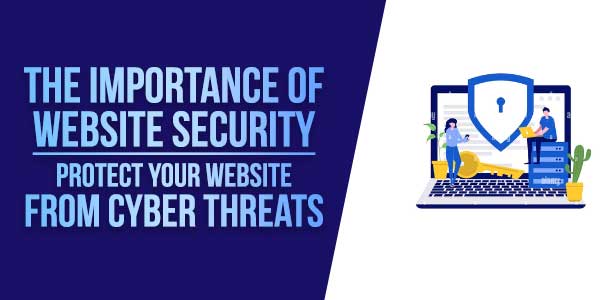
Creating a website is one of the most crucial elements that can determine a business’s success. This can involve several things. In this case, some of the most important elements can consist of a team of web designers, developers, and many more. However, website maintenance is one of the most crucial factors in this case.
This refers to the maintenance and gradation of a website. This can, again, involve several factors, such as new pieces of code and newer features. However, in this case, one of the most important things is website protection or security.
This is not only an important part of website building and development but also that of cyber security as a whole. This is because, currently, there are several criminal elements present who can hack into a website. The result of this is always bad. This is because such a phenomenon leads to a website suffering several issues and becoming nonfunctional.
Therefore, every web developer and designer needs to know several aspects of website security. If you are someone who can build a website, then you should also know about these facts. This can help you to make better websites in the future.
Table of Contents
About The Concept Of Website Security:
Website security refers to the measures and policies that can help protect a website from cyber-attacks. Ensuring website security can often be a complex or time-consuming task. This activity can involve a group of people and many tools as well.
These include several talented coders and excellent software security measures. The presence of all this can help make software secure from any threat. Ensuring website security might also involve several big changes to a website. These include changes to a website’s code or its overall features.
Common Problems That Affect Websites:
Every web designer should first know the different problems affecting websites. These mostly consist of different types of cyber attacks by criminals. These problems are as follows:-
Malware:
Malware is a malicious form of software that is harmful to other software or even overall systems. These can often appear as accidental downloads or links from anonymous users. These contain viruses that can disrupt a system’s functioning. The result is a loss of data and a website facing many issues.
Cross-Site Scripting:
Another major form of problem that can affect websites is cross-site scripting. This mainly consists of malicious programs that hackers use to infect systems. Even today, it is one of the most dangerous threats to any website. This is mainly because most codes can enter a website despite the presence of several security features.
SQL Injection:
An SQL injection is one of the worst problems that can affect a website’s security. This consists of a program that a hacker puts into a website. This mostly happens due to a lack of security from a website against unauthorized users.
This includes a lack of prevention of the use of certain special characters. The result is that a person can enter into a system freely and introduce a new code. This can change, disrupt or destroy data and the functioning of a website.
Man-In-The-Middle Attacks:
This is a form of cyber-attack that happens mostly on websites that allow interactive services between people. In this case, one can steal data about conversations or even transactions. Such criminals can use such data against a person. Therefore, one can say that it is a form of breach of privacy.

Ways To Protect A Website From Cyber Threats:
The threats mentioned above can cause severe harm to a website. In fact, as time passes, cyber criminals’ activities also seem to upgrade. However, this does not mean achieving complete cyber security is impossible. It is quite the opposite.
This is because several ways and procedures can help protect a website from external threats. These procedures are as follows:-
Securing Of Login Credentials:
People who manage a website can have their own login or sign-up credentials. These, of course, include usernames and passwords. However, website administrators must protect such credentials from others.
This is because giving away such information to anyone can be a great invitation to cyber criminals to attack a website. Therefore, one should only provide such information to a handful of trustworthy individuals who can manage the website.
It will be helpful if one can restrict the amount of access that one can get to a website. This will also be a great way to minimize the chances of fraudulent activities.
Having An SSL Certificate:
An SSL certificate is one of the best ways to prevent a sudden breach in a website. Installing such a certificate can prevent other people from gaining illegal access to a website. One can also prevent hackers from stealing data about conversations on interactive websites. Thus, such a measure can ensure total privacy on a website.
Setting Up Strong Passwords:
As mentioned above, a person should always protect information about passwords and usernames. However, one more important thing is the creation of a strong password. A strong password is a credential information that one cannot guess easily.
Generally, most hackers can enter one’s account or website by guessing what a user’s password can be. However, a strong password prevents such a thing from happening. Most hackers can never break into a website if there is a strong password protecting it. It can be anything that is a mixture of different characters.
Setting Up A Firewall Protection Mechanism:
One of the best ways to protect a website is by setting up a firewall application or mechanism. Most people refer to these as website application firewalls or WAFs. The main purpose of such a software system is to prevent malicious software from entering a website.
Apart from this, such systems can also prevent one from stealing important data from a website. These are one of the most flexible forms of protection software that a person can use. This is because one can easily customize its policies to fit usage on a website.
However, there are certain limits to the customization process as well. This prevents hackers from taking unfair advantage of the software. Thus, these programs are the best for ensuring overall software protection.
One Final Note About Website Protection:
In the current times, website protection might not be an easy task. This is mainly due to the presence of several new forms of technology. There is also the fact that with time such technologies are also witnessing upgradation.
Therefore, every web developer must know about the latest technologies and their use in website protection. This can help one understand how to protect a website from unscrupulous elements. There are certain simple things present that one can do to protect a website.
This can include repetitive malware scans in a computer, for example. One does not need to be a web designer for this and should only know about certain software that can serve this purpose. One can also change and update their login credentials often. This can also protect a website as well.

 About the Author:
About the Author:
















Your article was really intelligent, well-written, and persuasive. I’ve been thinking about applying this concept at Checkmate Global Technologies. Without a doubt, I’ll be looking forward to your future article.
Welcome here and thanks for reading our article and sharing your view. This will be very helpful to us to let us motivate to provide you with more awesome and valuable content from a different mind. Thanks again. Please contact us via the contact form for more info.